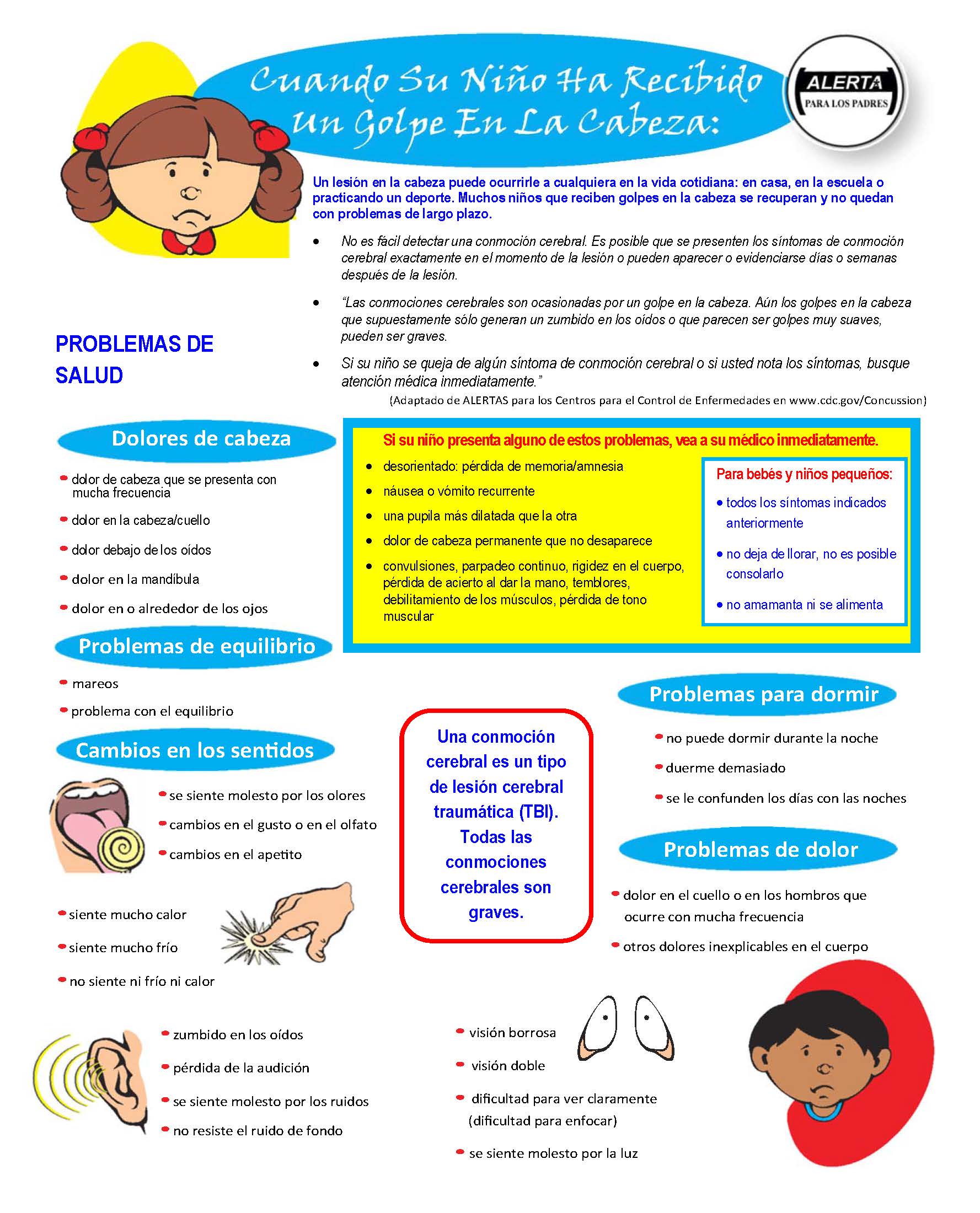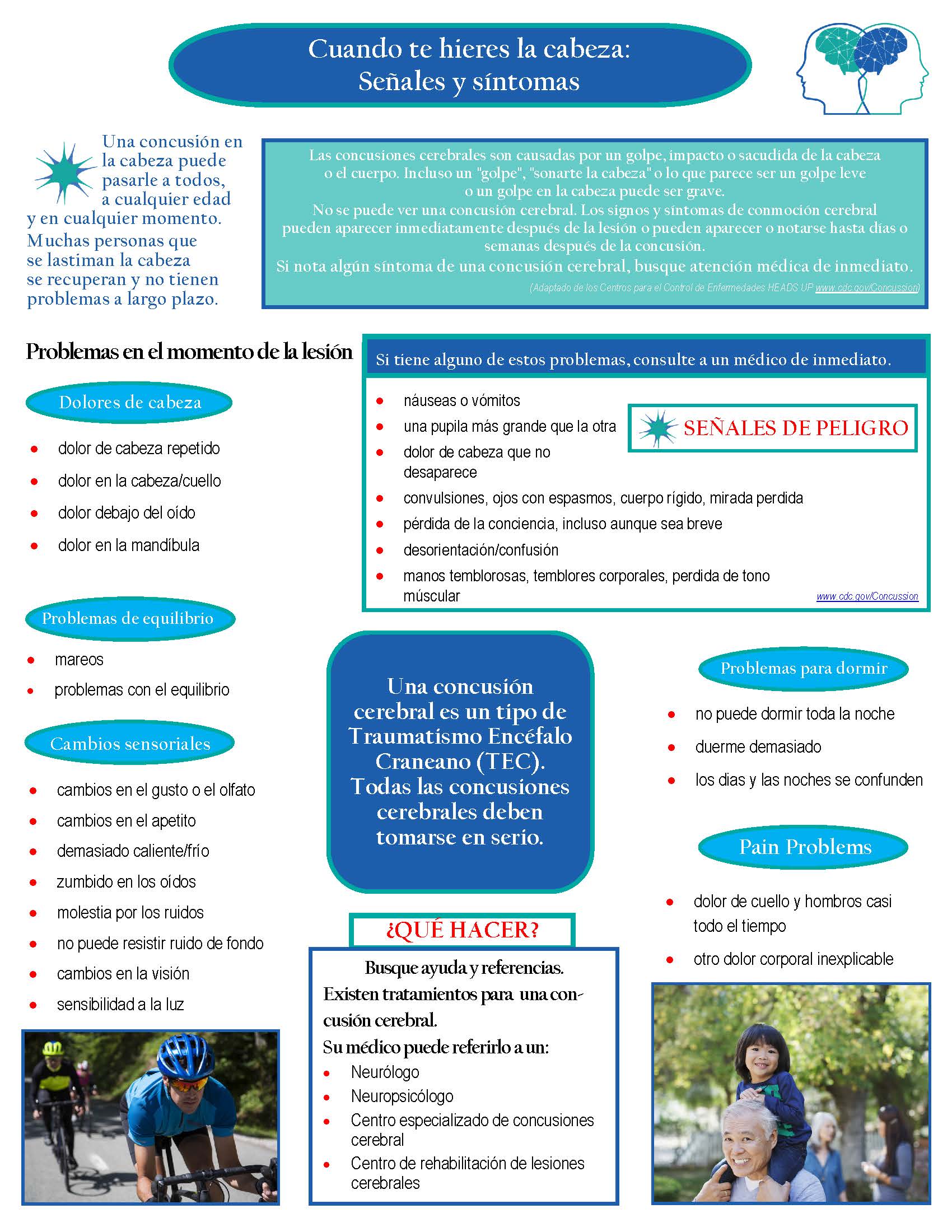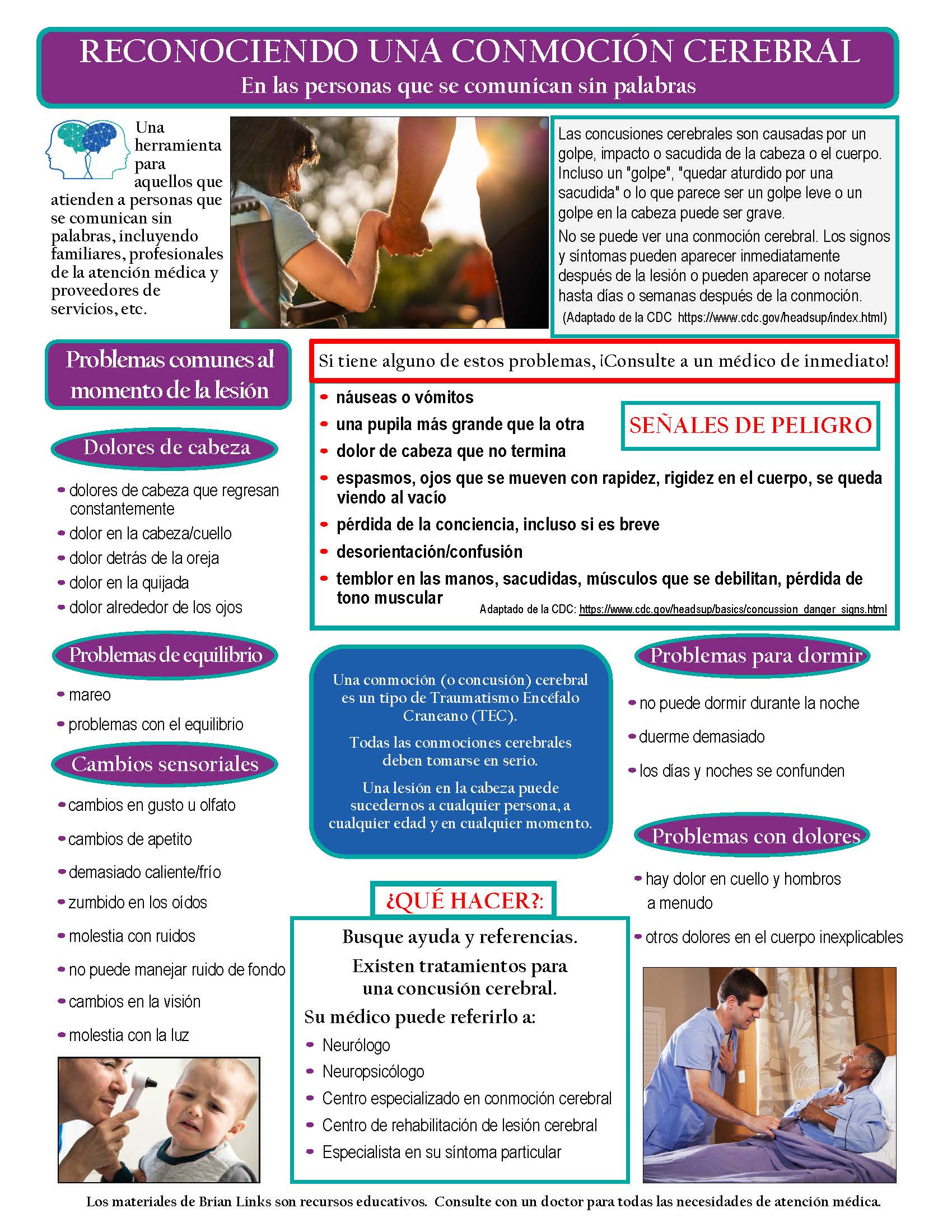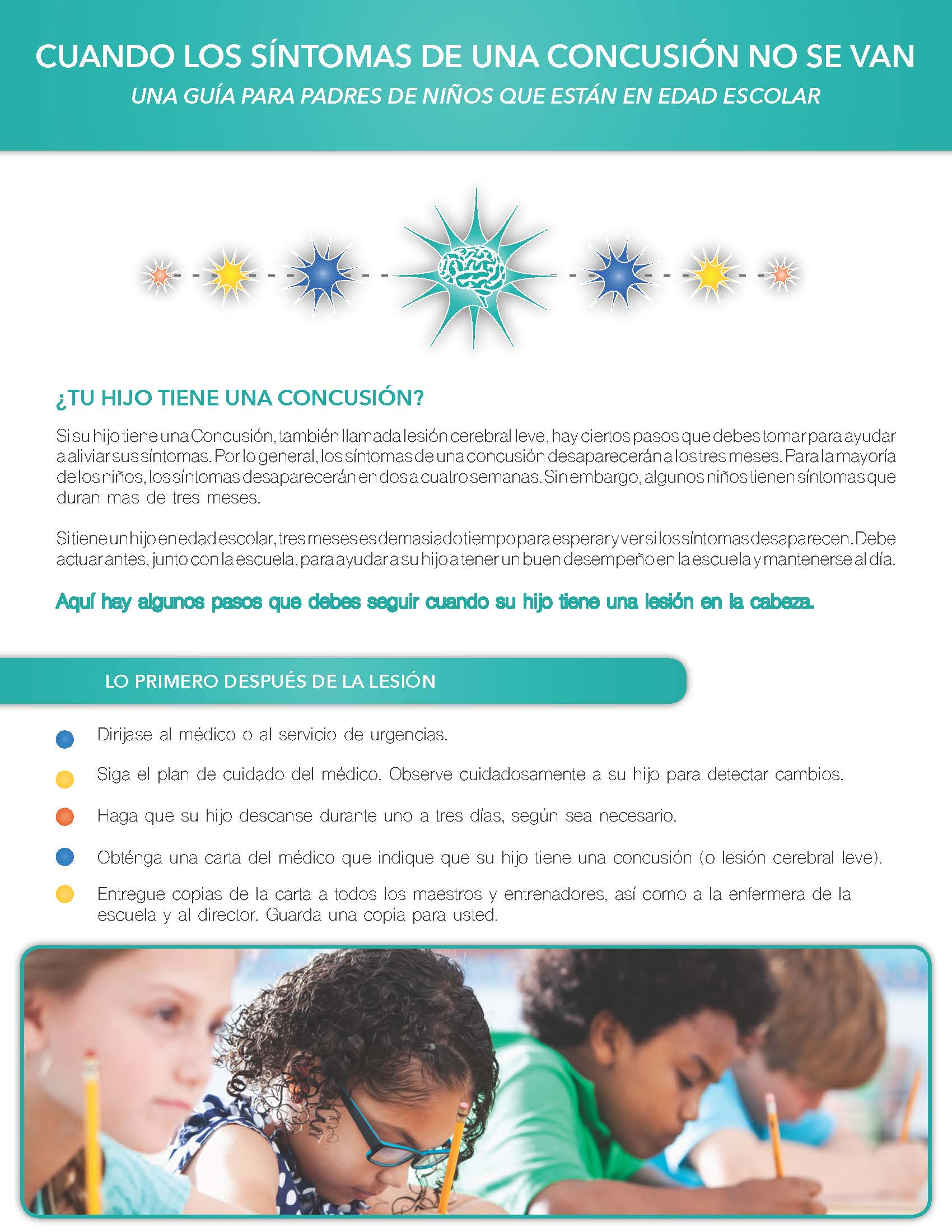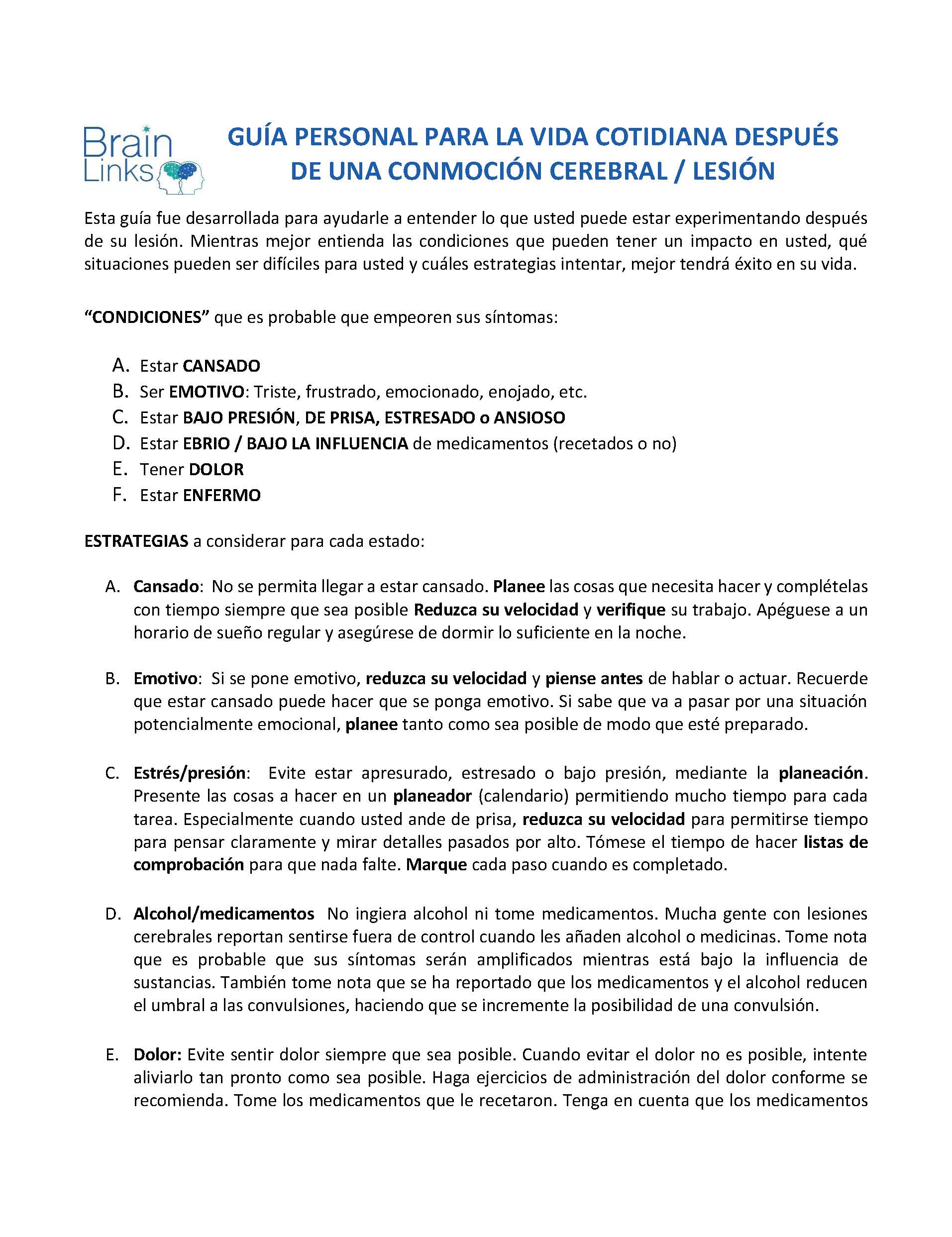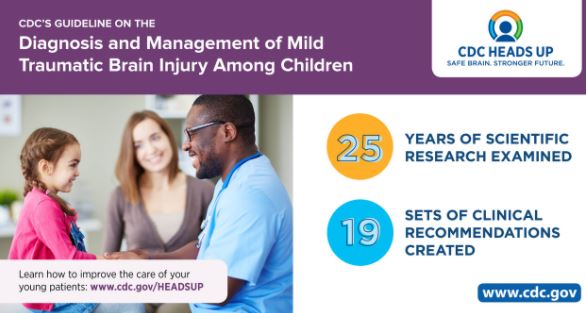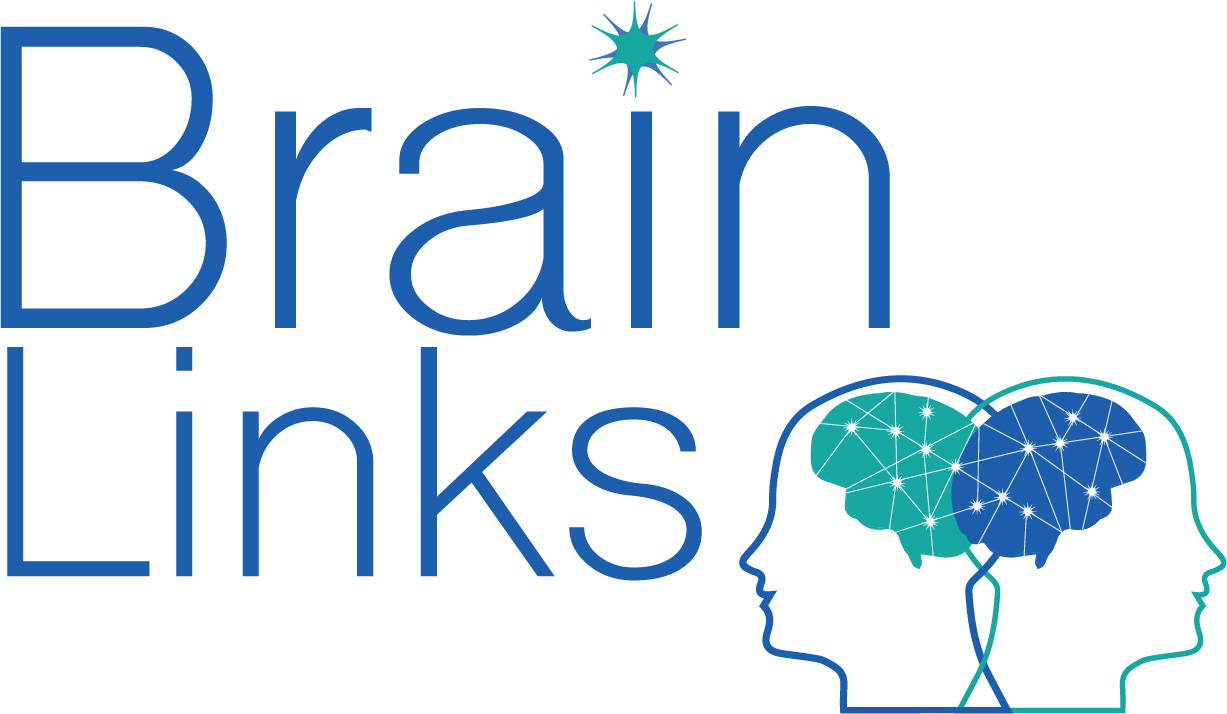
Follow Us
TN Crisis Hotline: Call 855-CRISIS-1 (855-274-7471)
- Text “TN” to 741-741 if you are experiencing a mental health emergency
- Services are free and available 24 hours a day, 7 days a week, and 365 days a year.
TN Child Abuse Referral - Report Child Abuse: 877-237-0004.
American Psychological Association's Help Center to find a local psychologist.

If you are looking for information supporting People with Brain Injury and their Families and Caregivers, check out the "Have an Injury?" section.
Additional resource materials in Español can also be found in this section.
Brain Links' TBI Toolkits are your go-to place for an organized collection of Brain Injury Resources.
Brain Health YouTube Video Playlist
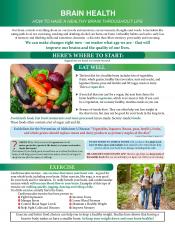 Brain Health: How to Have a Healthy Brain Throughout Life: By design provides research-based tips for creating a healthy brain, regardless of age. This guide was originally developed to help people with brain injuries recover to the fullest extent possible and to help them prevent or minimize potential negative changes as they age. However, it was quickly realized that the information in Brain Health is beneficial for everyone. English and in Español
Brain Health: How to Have a Healthy Brain Throughout Life: By design provides research-based tips for creating a healthy brain, regardless of age. This guide was originally developed to help people with brain injuries recover to the fullest extent possible and to help them prevent or minimize potential negative changes as they age. However, it was quickly realized that the information in Brain Health is beneficial for everyone. English and in Español
English text file and Rationale for Brain Health Materials
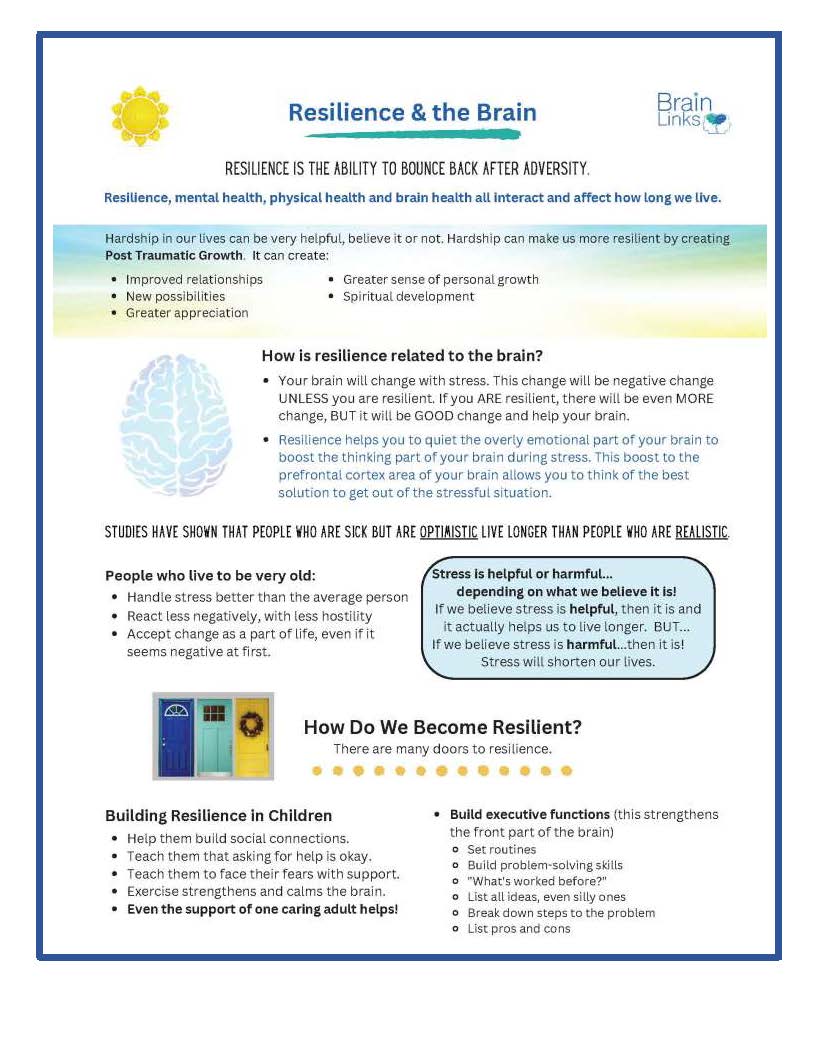 Resilience and the Brain: This material is great for people of all ages who are looking to learn more about resilience, helping themselves and/or others. Building resilience supports brain health, mental health, physical health and ultimately longevity. English Text Document.
Resilience and the Brain: This material is great for people of all ages who are looking to learn more about resilience, helping themselves and/or others. Building resilience supports brain health, mental health, physical health and ultimately longevity. English Text Document.
Brainline: Resources about brain injury and PTSD
- Brainline for Military & Veterans: Help for service members, veterans, National Guard, reserve, families, and caregivers. Brainline En Español
- Brainline for Children with TBI: Information & resources for families & educators.
- Brainline for Caregivers
- Sign Up for the Newsletter
Department of Defense TBI Center of Excellence: TBICoE Mission: As the TBI Pathway of Care manager within the Military Health System, the Traumatic Brain Injury Center of Excellence promotes state-of-the-science care from point-of-injury to reintegration for service members, veterans, and their families to prevent and mitigate consequences of mild to severe TBI. TBICoE is a congressionally mandated collaboration of the Departments of Defense and Veterans Affairs and was formerly known as the Defense and Veterans Brain Injury Center (DVBIC).
Military Health System and Defense Health Agency, Traumatic Brain Injury Center of Excellence
Low Level Blast Exposure: Both providers and service members should be aware of the potential effects of low-level blast exposure and which occupations and heavy weapon systems are associated with increased risk of LLB exposure.
View: Service Members Factsheet
View: Medical Providers Factsheet
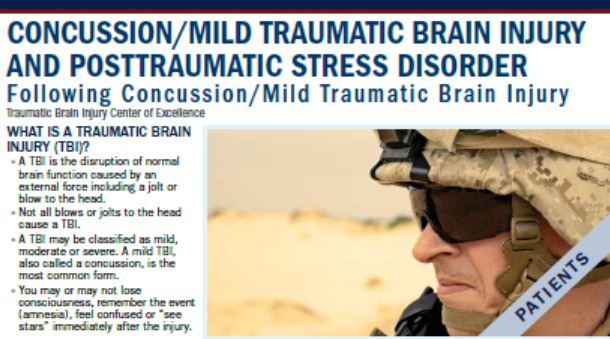 Concussion/Mild Traumatic Brain Injury and Posttraumatic Stress Disorder Following Concussion/Mild Traumatic Brain Injury. Released: September 2014 | Reviewed: April 2021 by the Traumatic Brain Injury Center of Excellence. This product is reviewed annually and is current until superseded. 800-870-9244 • Health.mil/TBICoE 4628.1.2.3
Concussion/Mild Traumatic Brain Injury and Posttraumatic Stress Disorder Following Concussion/Mild Traumatic Brain Injury. Released: September 2014 | Reviewed: April 2021 by the Traumatic Brain Injury Center of Excellence. This product is reviewed annually and is current until superseded. 800-870-9244 • Health.mil/TBICoE 4628.1.2.3
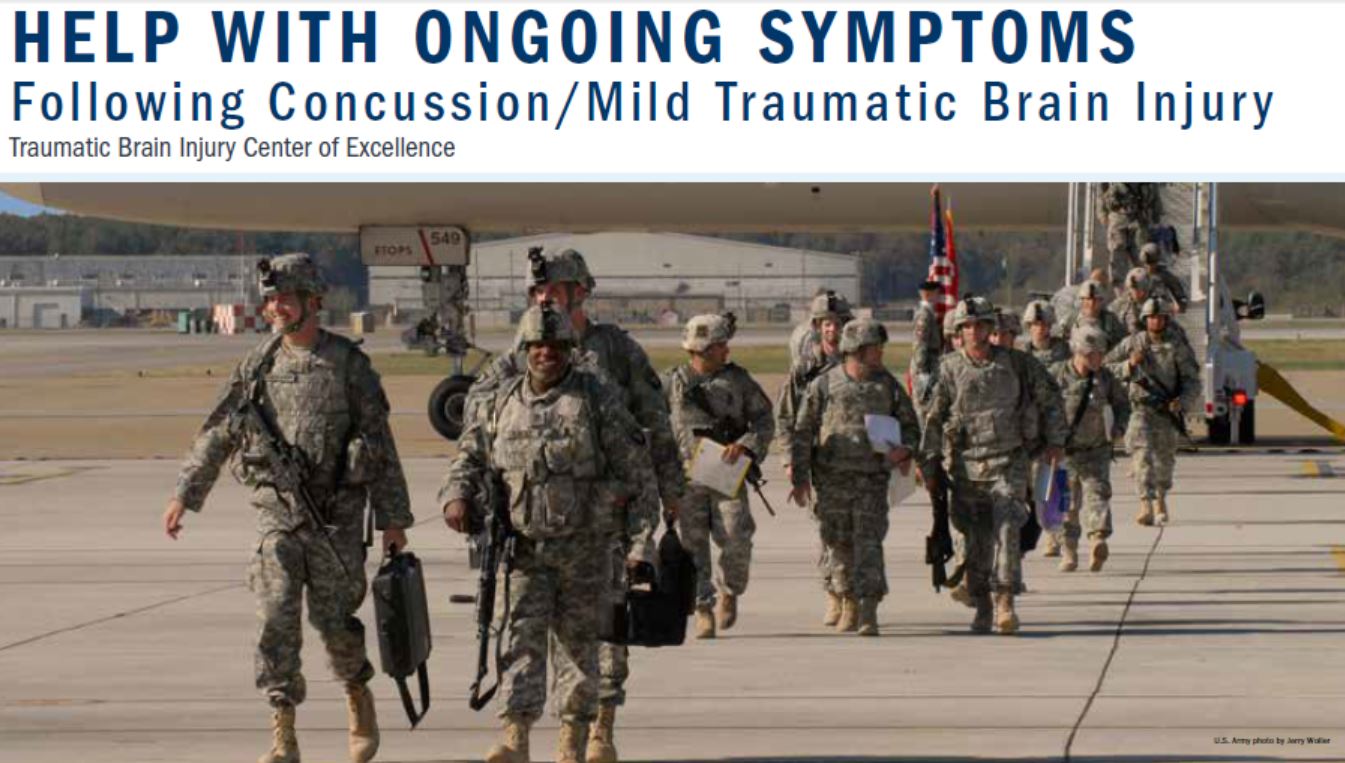 Help With Ongoing Symptoms Following Concussion/Mild Traumatic Brain Injury. Released: January 2010 | Reviewed: April 2021 by the Traumatic Brain Injury Center of Excellence. This product is reviewed annually and is current until superseded. 800-870-9244 • Health.mil/TBICoE 4272.1.4.3
Help With Ongoing Symptoms Following Concussion/Mild Traumatic Brain Injury. Released: January 2010 | Reviewed: April 2021 by the Traumatic Brain Injury Center of Excellence. This product is reviewed annually and is current until superseded. 800-870-9244 • Health.mil/TBICoE 4272.1.4.3

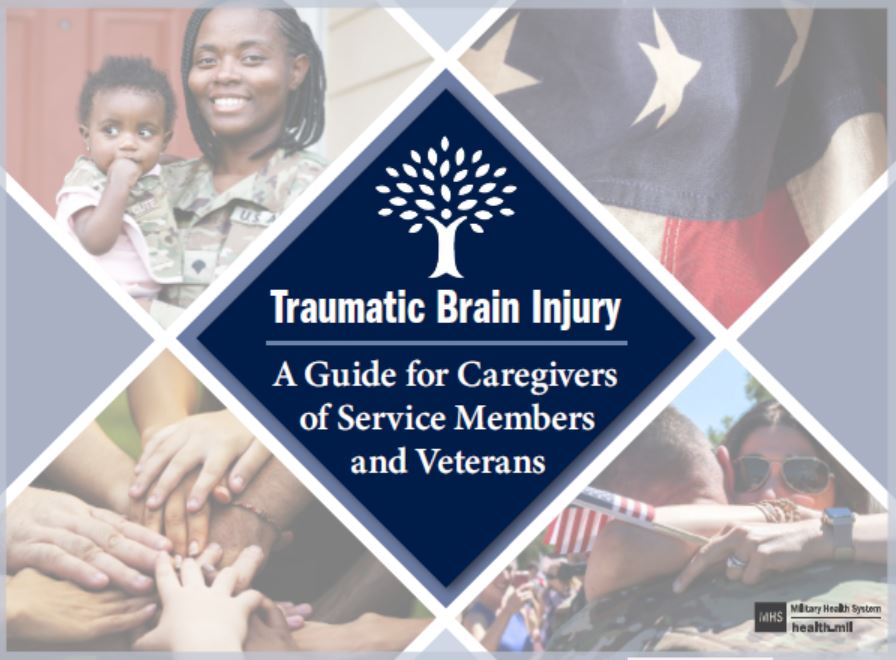 Traumatic Brain Injury: A Guide for Caregivers of Service Members and Veterans: This guide is a recovery support tool to assist caregivers of service members and veterans who have sustained a traumatic brain injury at any severity level. This 2021 revision replaces the original guide released in 2010.
Traumatic Brain Injury: A Guide for Caregivers of Service Members and Veterans: This guide is a recovery support tool to assist caregivers of service members and veterans who have sustained a traumatic brain injury at any severity level. This 2021 revision replaces the original guide released in 2010.
Topics include:
- Understanding TBI: This section includes information on types and diagnosis of TBI, the health care team, and what the recovery process may look like.
- Caregiver Strategies for Managing the Effects of TBI: This section includes information about understanding and addressing the different symptoms of TBI for the caregiver.
- Becoming a Family Caregiver: This section covers starting the caregiver journey, becoming an advocate, and learning how to take care of oneself.
- Caregiver Resources: This section includes helpful links for caregivers, printable forms and a glossary.
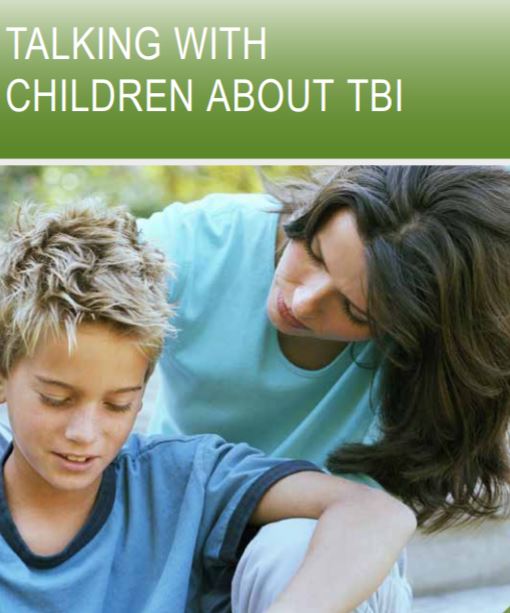 Talking With Children About TBI: Released June 2012 | Revised June 2019 by Defense and Veterans Brain Injury Center.
Talking With Children About TBI: Released June 2012 | Revised June 2019 by Defense and Veterans Brain Injury Center.
This product is reviewed annually and is current until superseded. 800-870-9244 • dvbic.dcoe.mil
PUID 4811.1.2.5
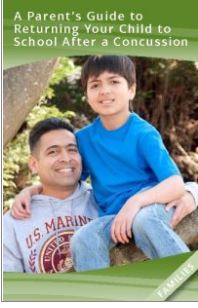
A PARENT’S GUIDE TO RETURNING YOUR CHILD TO SCHOOL AFTER A CONCUSSION
Defense and Veterans Brain Injury Center (DVBIC) released a 26-page guide that offers practical advice to parents on how to recognize the signs and symptoms of a concussion, information on treatment and recovery, and what a parent can do to support a child’s recovery and successful return to school.
The new “Parent’s Guide to Returning Your Child to School After a Concussion” advises parents of children who have been diagnosed with a mild traumatic brain injury (TBI), also known as concussion, on how to help their child successfully return to school and related activities
Topics in this guide:
1. Signs and Symptoms
2. Support Recovery
3. Returning to School
4. For Children with Longer Recovery Times
Wounded Warrior Project: FYI - Brainline.org is funded through the Wounded Warrior Project.
Who is a Warrior? Veterans and service members who incurred a physical or mental injury, illness, or wound while serving in the military on or after September 11, 2001. You are our focus. You are our mission.
- Start Your Journey: Free programs & services to support you no matter what.
- Find Your Community: Your needs matter and we have a community to make sure you're not alone.
- See the Difference: Each day, our warriors set ambitious goals and we celebrate their accomplishments.
VIDEO: Quiet Explosions | Healing the Brain: Did you know one hundred and fifty-four veterans commit suicide each week?
- Quiet Explosions is the story of Special Forces Green Beret, Andrew Marr, who returned home from his third deployment, a quietly broken man. The high-ranking explosives expert suffered a multitude of traumatic brain injuries after being “front and center” to hundreds if not thousands of detonations in Afghanistan.
- Issued thirteen mind-altering medications including narcotics by the VA, Marr continued to suffer fatigue, depression, panic, anxiety, disorientation, memory loss, and chronic pain. His favorite bedtime companions, whiskey and a loaded shotgun, almost destroyed him and his family. When it was almost too late, he found Dr. Mark Gordon, Neuroendocrinologist, who developed a safe treatment protocol for TBI with or without PTSD. Their work has been helping veterans and civilians through their Warrior Angels Foundation and the Millennium-TBI Project.
An estimated 2.1 million people–military and others–sustain a TBI annually. The science used to develop this treatment is behind why conventional protocols have failed and why this very specific kind of healing, can alter the course of people’s lives forever. This documentary film is not to be missed. Based upon Andrew and Adam Marrs’ best seller – Tales from the Blast Factory.

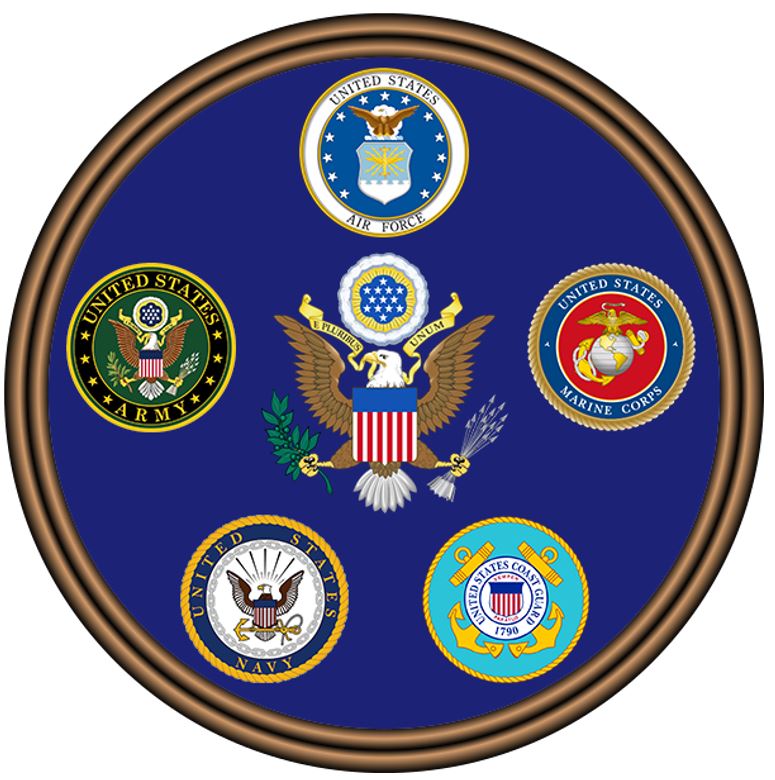
National Public Radio (NPR): The Impact of War: Report To Army Finds Blast From Some Weapons May Put Shooter's Brain At Risk
Journal of Military and Veterans' Health (JMVH): Concussion Within the Military
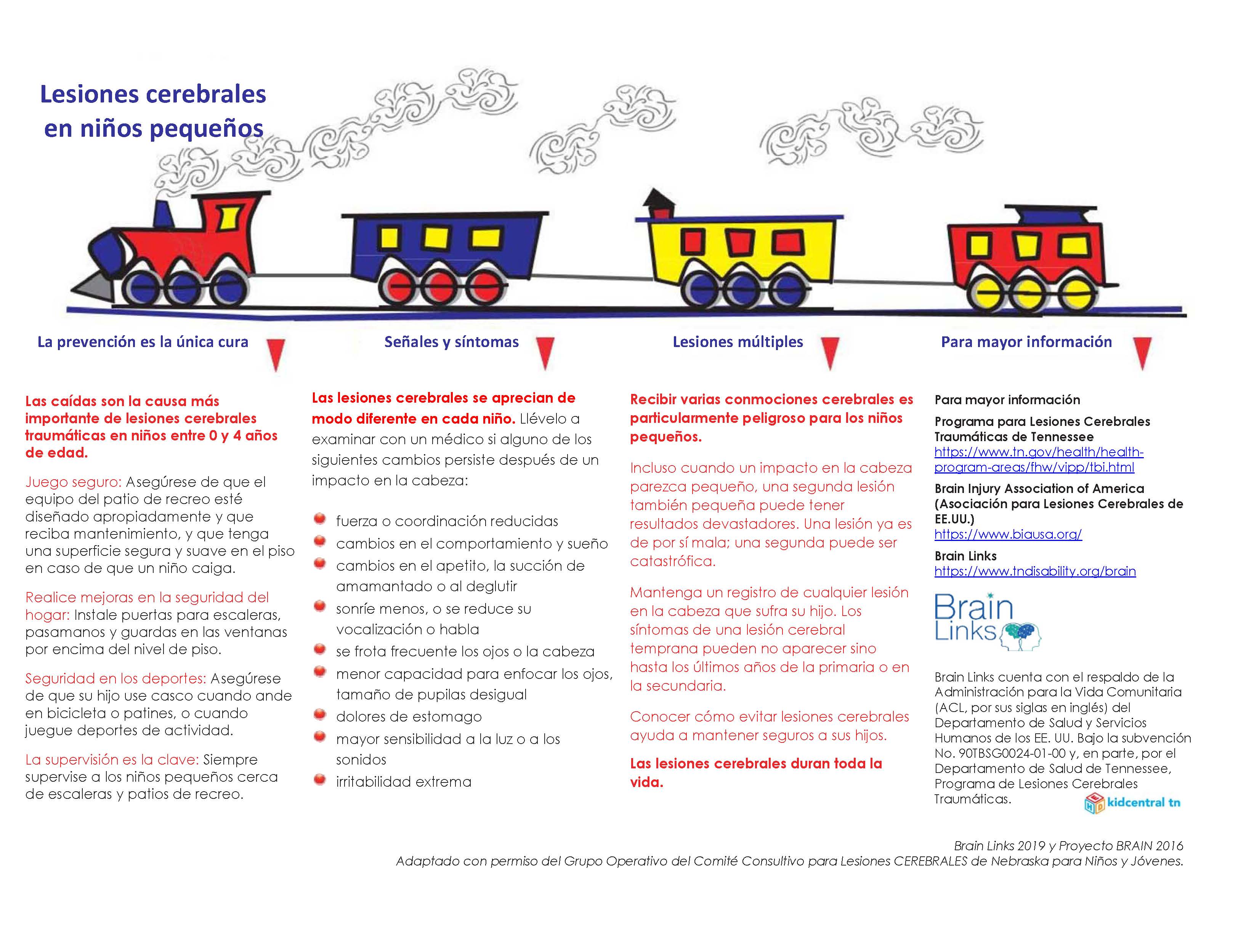
Lesiones cerebrales en niños pequeños
Cuando Su Niño Ha Recibido un Golpe En La Cabezza: Un lesión en la cabeza puede ocurrirle a cualquiera en la vida cotidiana: en casa, en la escuela o practicando un deporte. Muchos niños que reciben golpes en la cabeza se recuperan y no quedan con problemas de largo plazo.
Cuando te hieres la cabeza: Señales y síntomas

Reconociendo Una Conmoción Cerebral En las personas que se comunican sin palabras

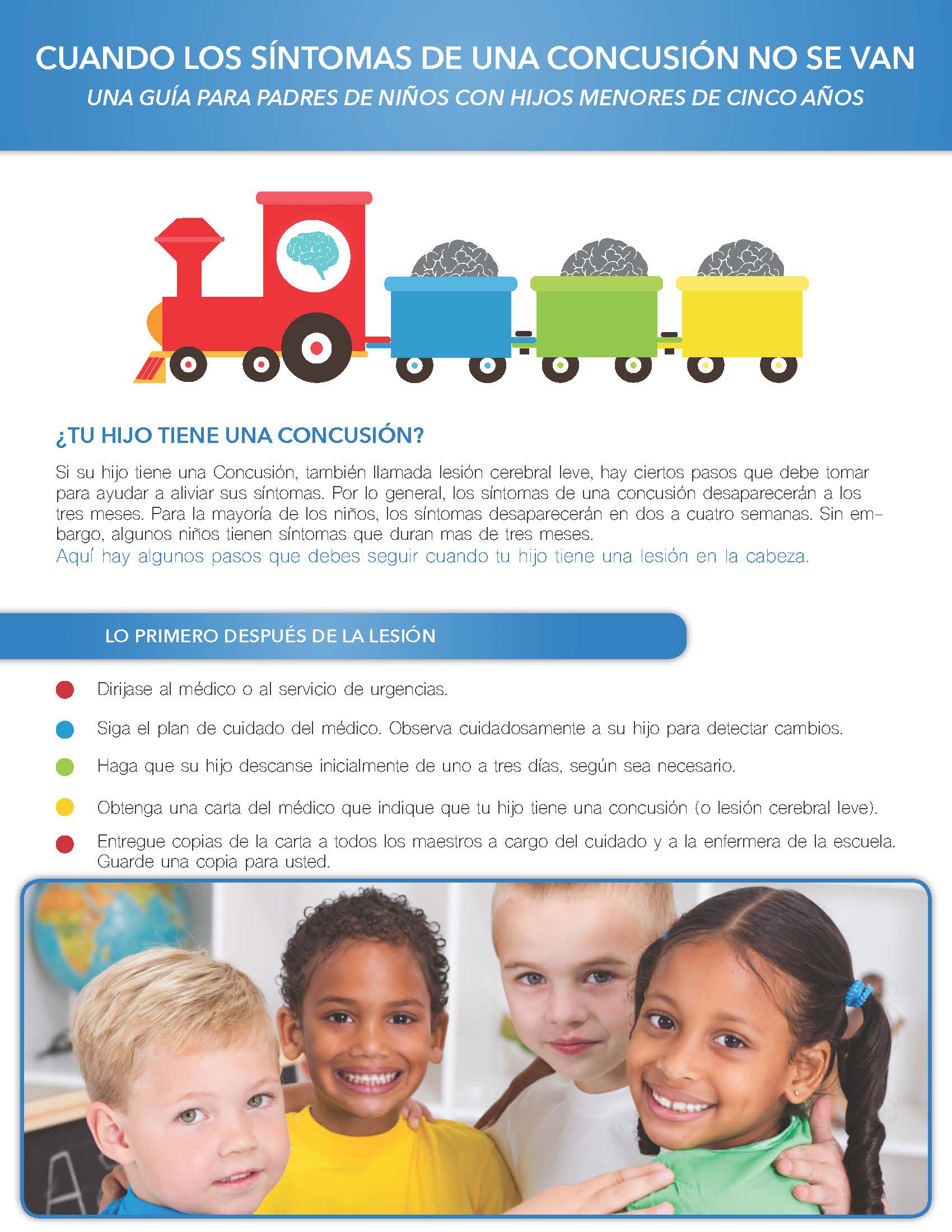 CUANDO LOS SÍNTOMAS DE UNA CONCUSIÓN NO SE VAN UNA GUÍA PARA PADRES DE NIÑOS CON HIJOS MENORES DE CINCO AÑOS
CUANDO LOS SÍNTOMAS DE UNA CONCUSIÓN NO SE VAN UNA GUÍA PARA PADRES DE NIÑOS CON HIJOS MENORES DE CINCO AÑOS

GUÍA PERSONAL PARA LA VIDA COTIDIANA DESPUÉS DE UNA CONMOCIÓN CEREBRAL / LESIÓN

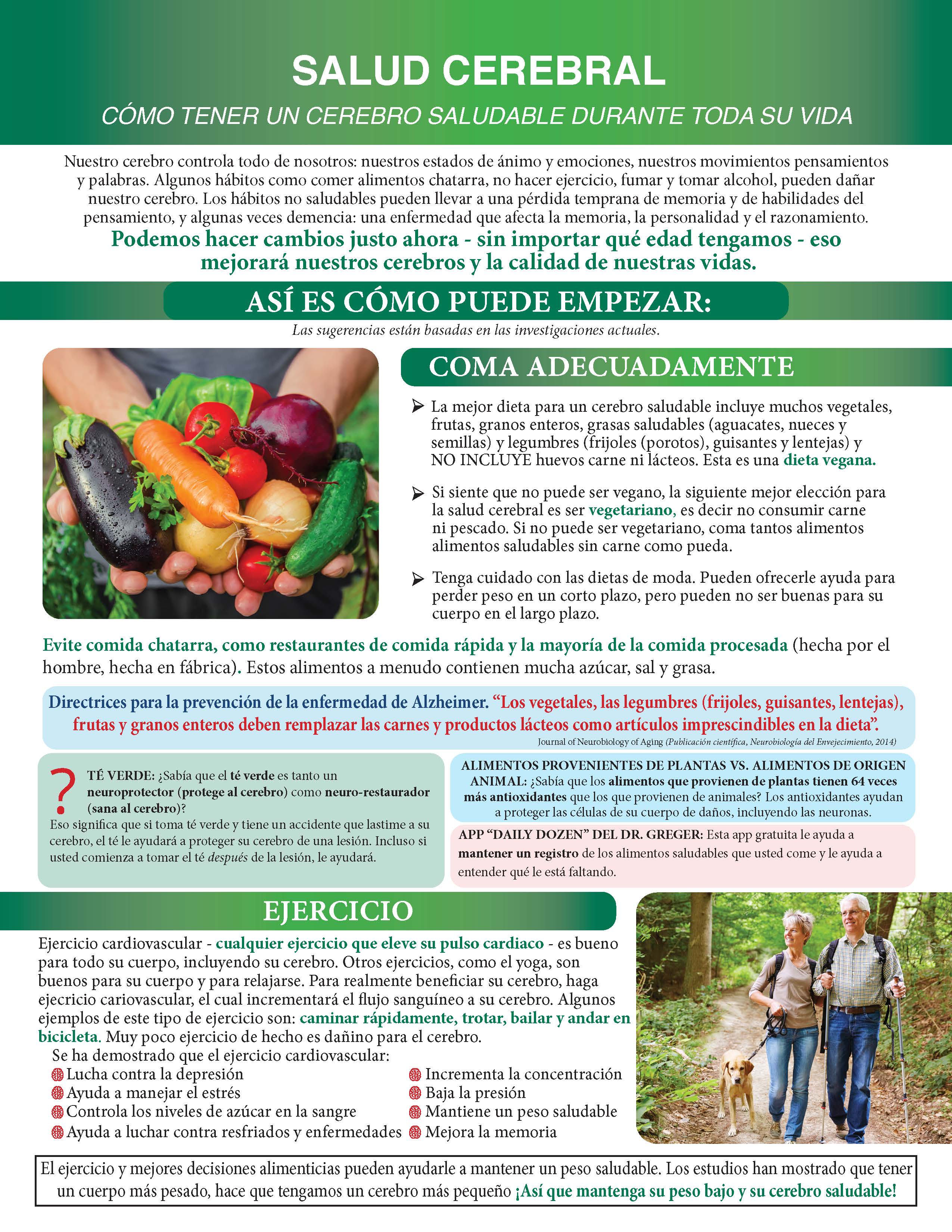 Salud Cerebral: Como Tener Un Cerebri Saludable Durante Toda Su Vida: Nuestro cerebro controla todo de nosotros: nuestros estados de ánimo y emociones, nuestros movimientos pensamientos y palabras. Algunos hábitos como comer alimentos chatarra, no hacer ejercicio, fumar y tomar alcohol, pueden dañar nuestro cerebro. Los hábitos no saludables pueden llevar a una pérdida temprana de memoria y de habilidades del pensamiento, y algunas veces demencia: una enfermedad que afecta la memoria, la personalidad y el razonamiento.
Salud Cerebral: Como Tener Un Cerebri Saludable Durante Toda Su Vida: Nuestro cerebro controla todo de nosotros: nuestros estados de ánimo y emociones, nuestros movimientos pensamientos y palabras. Algunos hábitos como comer alimentos chatarra, no hacer ejercicio, fumar y tomar alcohol, pueden dañar nuestro cerebro. Los hábitos no saludables pueden llevar a una pérdida temprana de memoria y de habilidades del pensamiento, y algunas veces demencia: una enfermedad que afecta la memoria, la personalidad y el razonamiento.

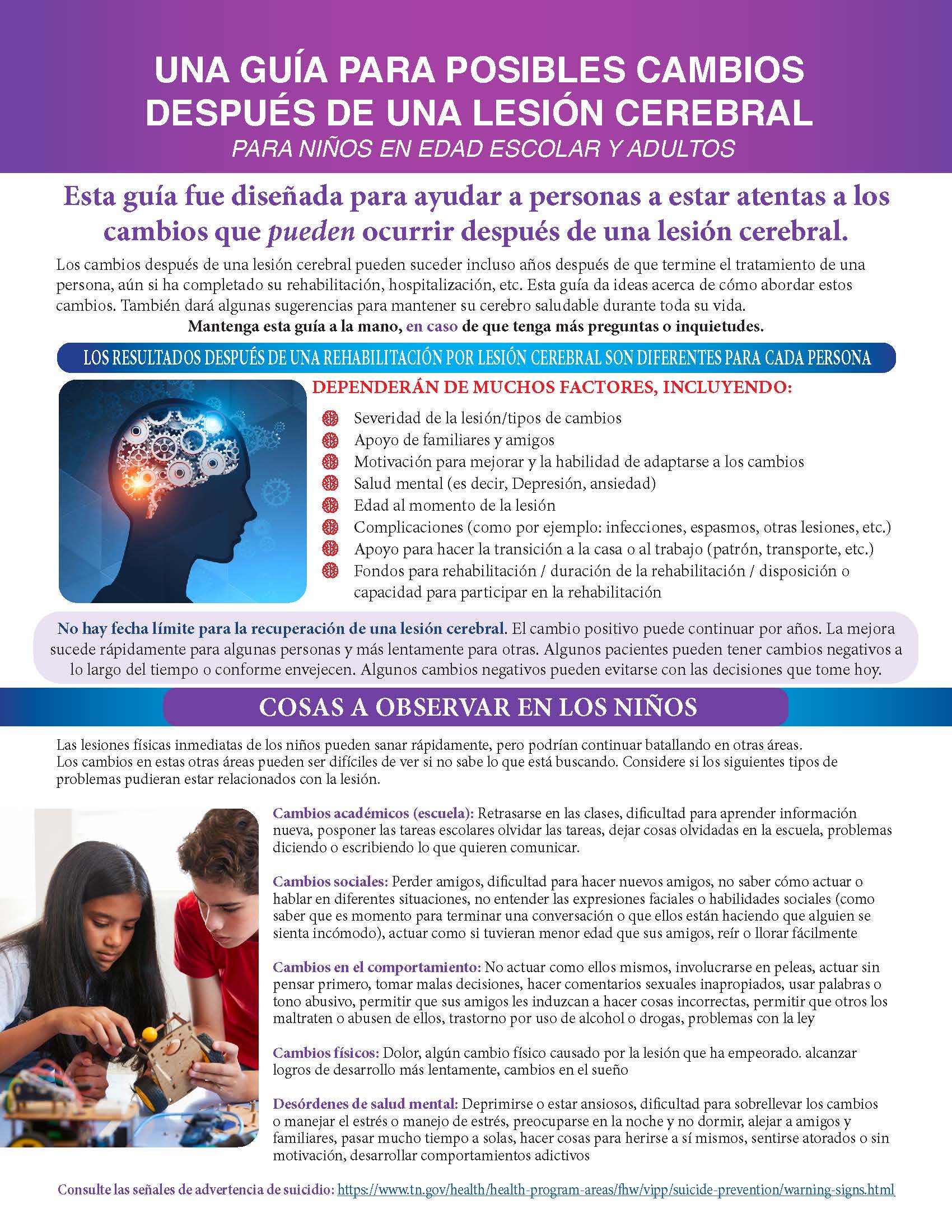 Una Guía Para Posibles Cambios Después De Una Lesión Cerebral. Esta guía fue diseñada a ayudar a las personas a observar cambios que pueden aparecer después de una lesión cerebral. Los cambios después de una lesión cerebral pueden suceder incluso años después de que termine el tratamiento de una persona, aún si ha completado su rehabilitación, hospitalización, etc. Esta guía da ideas acerca de cómo abordar estos cambios. También dará algunas sugerencias para mantener su cerebro saludable durante toda su vida.
Una Guía Para Posibles Cambios Después De Una Lesión Cerebral. Esta guía fue diseñada a ayudar a las personas a observar cambios que pueden aparecer después de una lesión cerebral. Los cambios después de una lesión cerebral pueden suceder incluso años después de que termine el tratamiento de una persona, aún si ha completado su rehabilitación, hospitalización, etc. Esta guía da ideas acerca de cómo abordar estos cambios. También dará algunas sugerencias para mantener su cerebro saludable durante toda su vida.

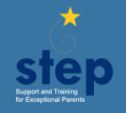 Bienvenido a STEPNuestra misión es empoderar a los padres a través de la información, la capacitación y el apoyo para que se conviertan un participaten eficaz con profesionales en la planificación de programas educativos adecuados para sus hijos.
Bienvenido a STEPNuestra misión es empoderar a los padres a través de la información, la capacitación y el apoyo para que se conviertan un participaten eficaz con profesionales en la planificación de programas educativos adecuados para sus hijos.

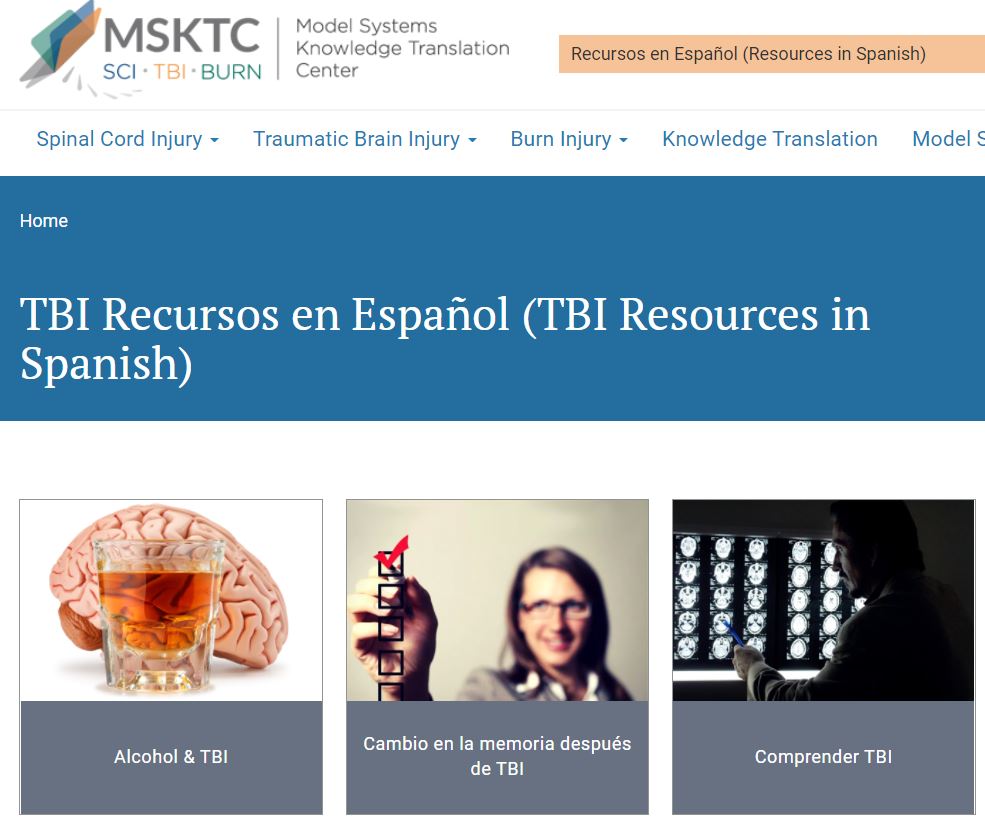 TBI Recursos en Español: Model Systems Knowledge Translation Center (MSKTC):
TBI Recursos en Español: Model Systems Knowledge Translation Center (MSKTC):
El consumo de alcohol después de una lesión cerebral traumática
Cambio en la memoria después de TBI
-
Comprensión y afrontamiento de la irritabilidad, la ira y la agresión después de una LCT
-
Lesión cerebral traumática y dolor crónico: Parte 1 Lesión cerebral traumática y dolor crónico: Parte 2
-
Información sobre el estado vegetativo y de mínima consciencia después de una lesión cerebral grave
-
La pérdida del olfato o del gusto después de una lesión cerebral traumática
-
Problemas cognitivos después de una lesión cerebral traumática
-
Los problemas del equilibrio después de una lesión cerebral traumática
-
Problemas de visión tras una lesión cerebral traumática (LCT)
-
Problemas emocionales después de una lesión cerebral traumática
-
El retorno a la escuela después de una lesión cerebral traumática
-
Lesión cerebral traumática y rehabilitación ambulatoria aguda
-
Las relaciones de pareja después de una lesión cerebral traumática
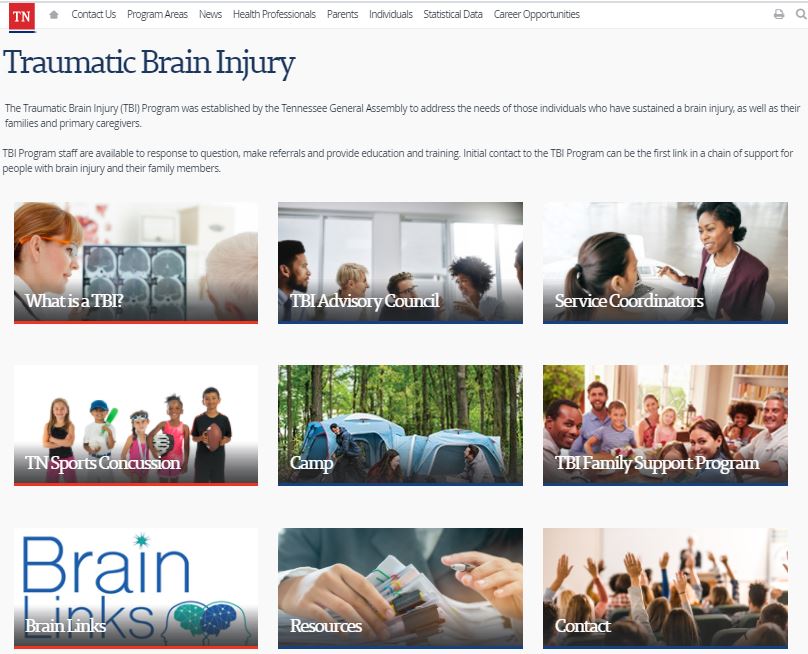 TN Traumatic Brain Injury (TBI) Program: Call Toll free 1-800-882-0611.
TN Traumatic Brain Injury (TBI) Program: Call Toll free 1-800-882-0611.
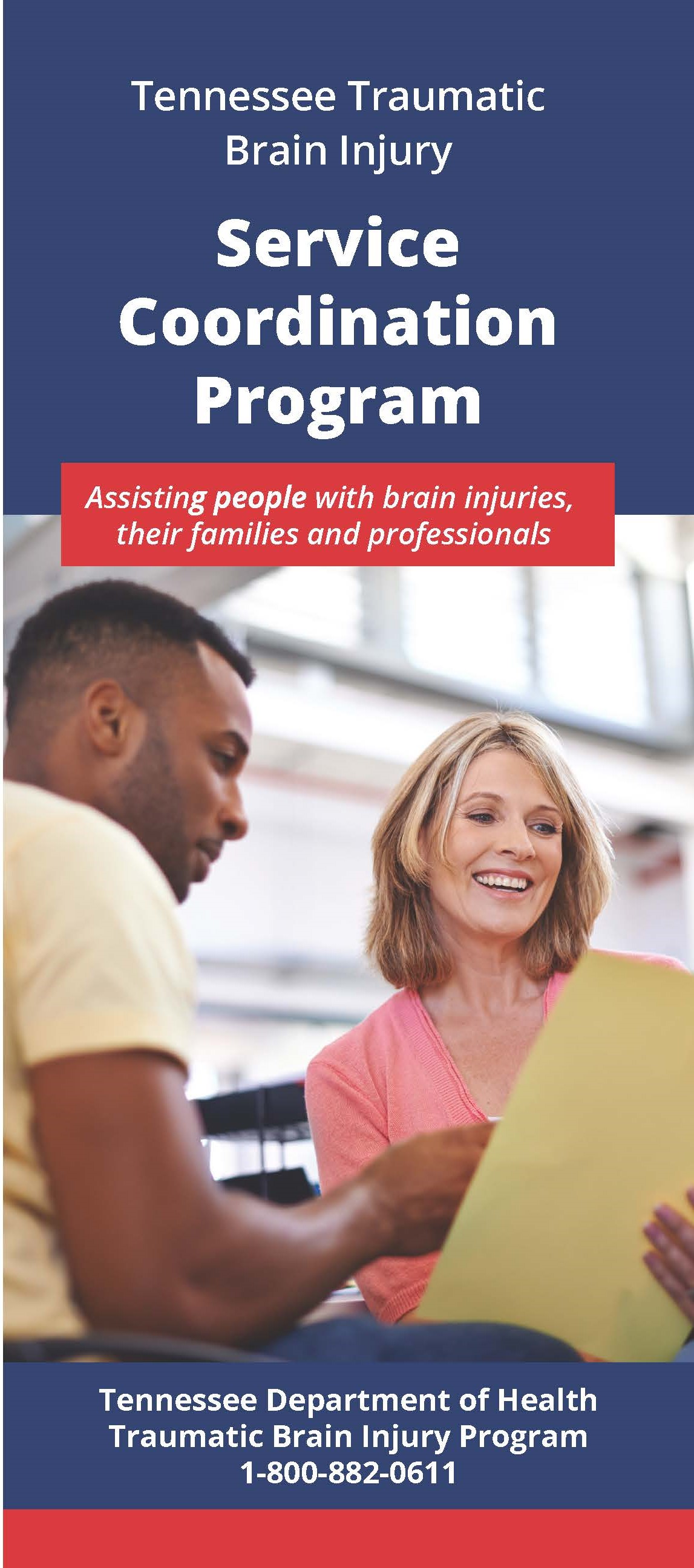 TN TBI Service Coordination Program: The Service Coordinator’s role is to work with persons with brain injury and their family to access current needs. Service Coordinator Contact Information.
TN TBI Service Coordination Program: The Service Coordinator’s role is to work with persons with brain injury and their family to access current needs. Service Coordinator Contact Information.
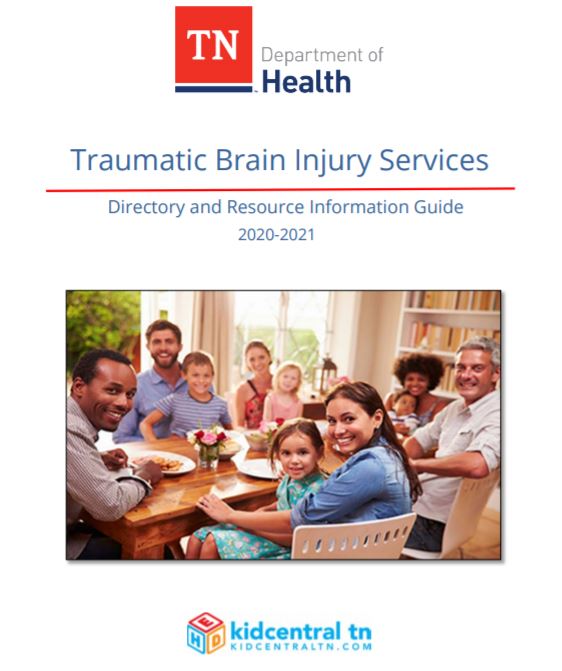 TN TBI Services Directory & Resource Information Guide
TN TBI Services Directory & Resource Information Guide
TN TBI Support Group contact information in your area.
Statewide Virtual Support Group Information: Rick Hall: (931) 372-8900 or email rickh@disabilityrightstn. or Lisa J. Morgan: (423) 602-7246 or via email chattanoogabraininjury@gmail.com

 Healing Heads Foundation of Middle Tennessee: Vision is to ensure that no stroke or brain injury survivor will go without rehabilitation due to their financial status. This resource is currently for those living in the Middle TN area.
Healing Heads Foundation of Middle Tennessee: Vision is to ensure that no stroke or brain injury survivor will go without rehabilitation due to their financial status. This resource is currently for those living in the Middle TN area.

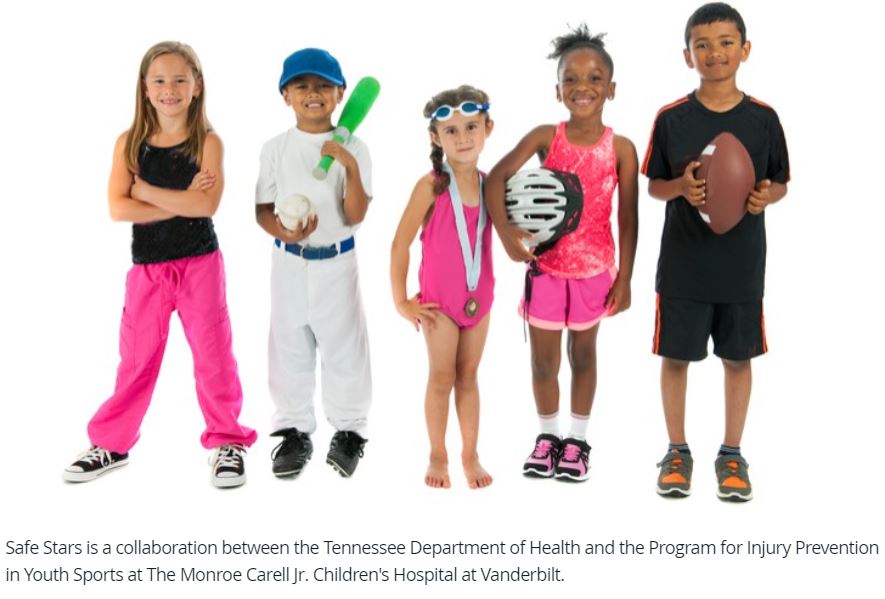 TN Safe Stars Initiative: The Safe Stars initiative recognizes youth sports leagues throughout Tennessee for providing the highest level of safety for their young athletes. Safe Stars consists of 3 levels: gold, silver, and bronze, and involves implementation of policies around topics such as concussion education, weather safety and injury prevention. Safe Stars’ goal is to provide resources and opportunities for every youth sports league to enhance their safety standards. The criteria for achieving recognition as a Safe Stars league has been developed by a committee of health professionals dedicated to reducing sports-related injuries among youth. Eamil Safe Stars to learn more at safestars.health@tn.gov.
TN Safe Stars Initiative: The Safe Stars initiative recognizes youth sports leagues throughout Tennessee for providing the highest level of safety for their young athletes. Safe Stars consists of 3 levels: gold, silver, and bronze, and involves implementation of policies around topics such as concussion education, weather safety and injury prevention. Safe Stars’ goal is to provide resources and opportunities for every youth sports league to enhance their safety standards. The criteria for achieving recognition as a Safe Stars league has been developed by a committee of health professionals dedicated to reducing sports-related injuries among youth. Eamil Safe Stars to learn more at safestars.health@tn.gov.
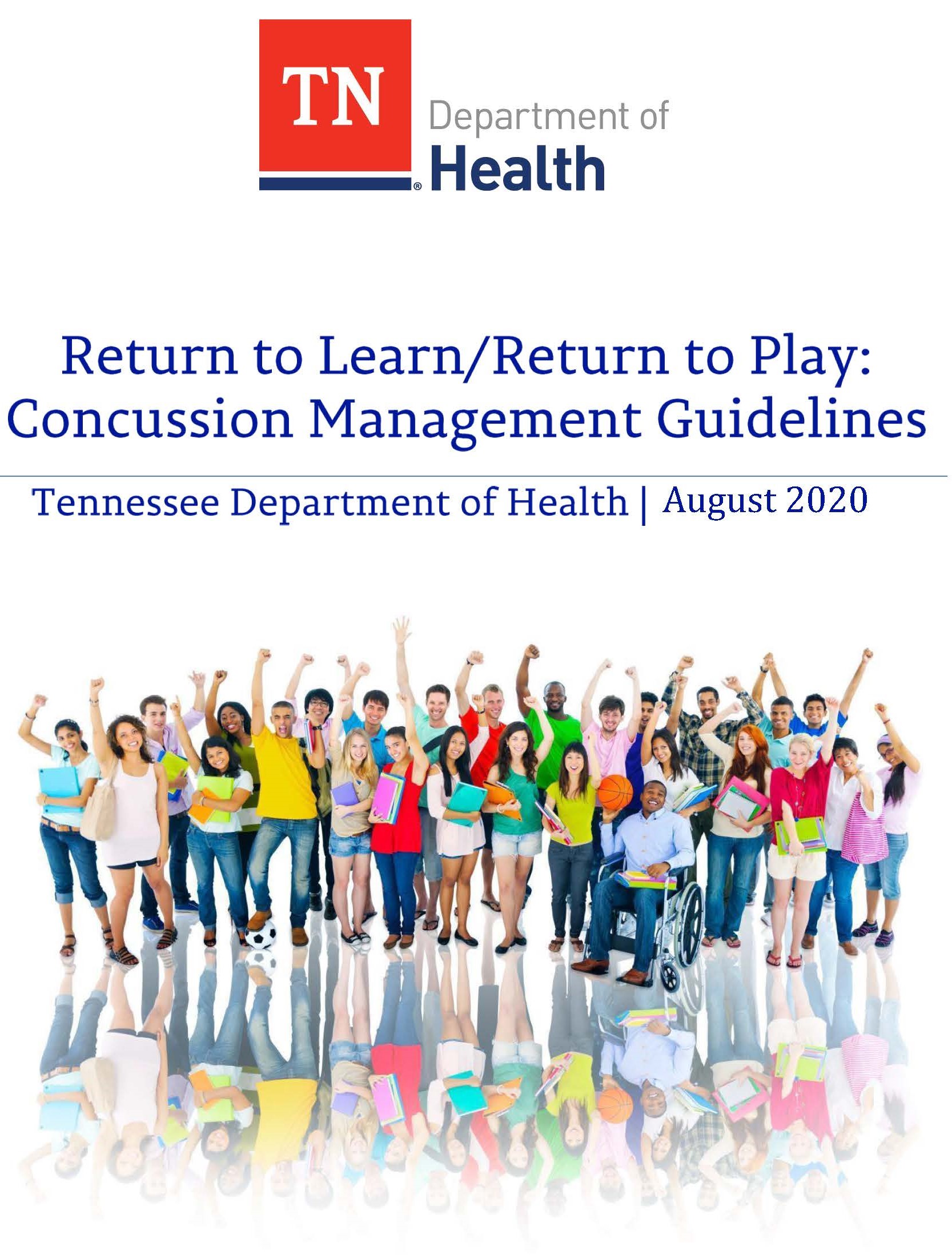 Tennessee Department of Health Return to Learn/Return to Play Concussion Management Guidelines
Tennessee Department of Health Return to Learn/Return to Play Concussion Management Guidelines
TN Secondary School Athletic Association (TSSAA)
- Health & Safety Policies
- TSSAA Concussion Policy
- Concussion in Sports (Required annually for all coaches)
- Required Paperwork for Parents and Student Athletes

TN Commission on Aging and Disability: The Tennessee Commission on Aging and Disability (formerly the Commission on Aging) was created by the Tennessee General Assembly in 1963. The Commission is the designated state agency on aging and is mandated to provide leadership relative to aging issues on behalf of older persons in the state. Our mission is to bring together and leverage programs, resources, and organizations to protect and ensure the quality of life and independence of older Tennesseans and adults with disabilities. Call 1-866-836-6678 from anywhere in the state to be automatically directed to your nearest Area Agency.
Alzheimer’s Tennessee: Mission: To serve those facing Alzheimer’s disease and related dementias, to promote brain health through education, and to champion global research, prevention and treatment efforts.
Alzheimer’s Tennessee, Inc. provides family support, offers community and professional education, advocates for the needs and rights of those with Alzheimer’s disease and related dementias, as well as research for its prevention, cure, and treatment.
TN Department of Intellectual and Developmental Disabilities (DIDD) Call Toll Free: (800) 535-9725.
TN Early Intervention System: (TEIS) is a program that provides services to children ages birth up to age three who have disabilities or other developmental delays. The TEIS program is a critically important program to supporting young children and their families to reach their optimal development.
TN Family Support Program: The program is funded by state dollars and designed to assist individuals with severe disabilities and their families to remain together in their homes and communities. Family Support is not a substitute for more comprehensive services provided under other programs, including the Medicaid HCBS Waiver, TennCare, Medicare, or private insurance.
- The primary purpose of the program is to support:
- Families who have school-aged or younger children with severe disabilities
- Adults with severe disabilities who choose to live with their families
- Adults with severe disabilities not supported by other residential programs funded by state or federal funds
- Services can include but are not limited to: Respite care, day care services, home modifications, equipment, supplies, personal assistance, transportation, homemaker services, housing costs, health-related needs, nursing and counseling.
TN Vocational Rehabilitation: The Division of Rehabilitation Services is responsible for the Vocational Rehabilitation (VR) Services program, which includes determination of eligibility, determination of the nature and scope of VR services and the provision of employment-focused rehabilitation services for individuals with disabilities consistent with their strengths, priorities, and resources.
 Help Hope Live's Mission as a national nonprofit is to support community-based fundraising for people with unmet medical and related expenses due to cell and organ transplants or catastrophic injuries and illnesses.
Help Hope Live's Mission as a national nonprofit is to support community-based fundraising for people with unmet medical and related expenses due to cell and organ transplants or catastrophic injuries and illnesses.
Brain Injury Association of America (BIAA): Mission: To advance awareness, research, treatment, and education and to improve the quality of life for all people affected by brain injury.
- BIAA Academy of Certified Brain Injury Specialists: The Academy of Certified Brain Injury Specialists (ACBIS) offers a voluntary certification program for both direct care staff and professionals working in brain injury services.
- BIAA National Brain Injury Information Center (NBIIC): 1-800-444-6443
United States Brain Injury Alliance: Mission: The mission of the United States Brain Injury Alliance is to engage the community in preventing brain injury and improving lives.

Pink Concussions: PINK Concussions is the FIRST EVER non-profit organization to focus on pre-injury education and post-injury medical care for women and girls with brain injury including concussion incurred from sport, violence, accidents or military service. VISION: A world in which women and girls with brain injuries are quickly identified and receive appropriate, compassionate care and support. MISSION: Our mission is to drive change and innovation to develop and implement sex-specific/gender-responsive, evidence-based strategies for the identification, management and support of women and girls with brain injuries.
Centre for Neuro Skills: Brain Injury News: Research Updates, Industry News and Survivor Stories. The world of advancements in brain injury knowledge and treatment is a rich composite of the progress being made by scores of dedicated people. The articles and reports below reflect current research, industry analysis, and stories of recovery. Innovations in patient care and the evolution of best practices in rehabilitation are among the subjects addressed by thought leaders, universities, and institutes noted here.
International Brain Injury Association: IBIA is dedicated to the development and support of multidisciplinary medical and clinical professionals, advocates, policy makers, consumers and others who work to improve outcomes and opportunities for persons with brain injury.
International Paediatric Brain Injury Society: IPBIS collaborates to disseminate knowledge by developing and sharing best practices, mentoring colleagues, advancing research and promoting prevention for the benefit of children, adolescents and young adults with ABI and their families.
National Association of State Head Injury Administrators (NASHIA) Mission: Since 1990, NASHIA has been fulfilling its mission of assisting State government in promoting partnerships and building systems to meet the needs of individuals with brain injury and their families.
- Serving as the leading source of information and education for state employees who support public brain injury programs.
- NASHIA provides information on national trends, best practices, and state contacts to federal agencies, state and national associations and TBI stakeholders across the country.
- NASHIA provides technical assistance to state governments and their partners as well as collective representation on federal policy issues through its membership.
Model Systems Knowledge Translation Center (MSKTC): Traumatic Brain Injury Factsheet Booklet in English and en Español.

Brainline: Resources about brain injury and PTSD.
- People with TBI: A brain injury can change your life in an instant. In this section for people with brain injury, you’ll find information about getting a good diagnosis, managing and treating your symptoms, and finding help in your own community. We also offer personal stories and blogs from people with ABI and TBI and some guidance on dealing with the social and emotional impact of a brain injury.
- Brainline for Caregivers: A brain injury affects not only the injured person but the whole family — from financial challenges and social upheaval to isolation and job loss. In this section for caregivers, family, and friends, you will find basic information about caring for a loved one with TBI; legal and financial guidance; workplace rights for caregivers; support group information; and advice about caregiver burnout among other topics.
- Professionals: Professionals in the field of brain injury will find online professional development courses and research on topics from chronic traumatic encephalopathy and blast injuries to neuroimaging techniques.
- Brainline for Military & Veterans: Help for service members, veterans, National Guard, reserve, families, and caregivers
- Brainline for Children with TBI: Information & resources for families & educators.

CDC: Traumatic Brain Injury & Concussion: Facts, Data, Reports and Resources.
Key Recommendations from the CDC Pediatric mTBI Guideline:
** Do not routinely image patients to diagnose mTBI.
** Use validated, age-appropriate symptom scales to diagnose mTBI.
** Assess evidence-based risk factors for prolonged recovery.
** Provide patients with instructions on return to activity customized to their symptoms.
** Counsel patients to return gradually to non-sports activities after no more than 2-3 days of rest.
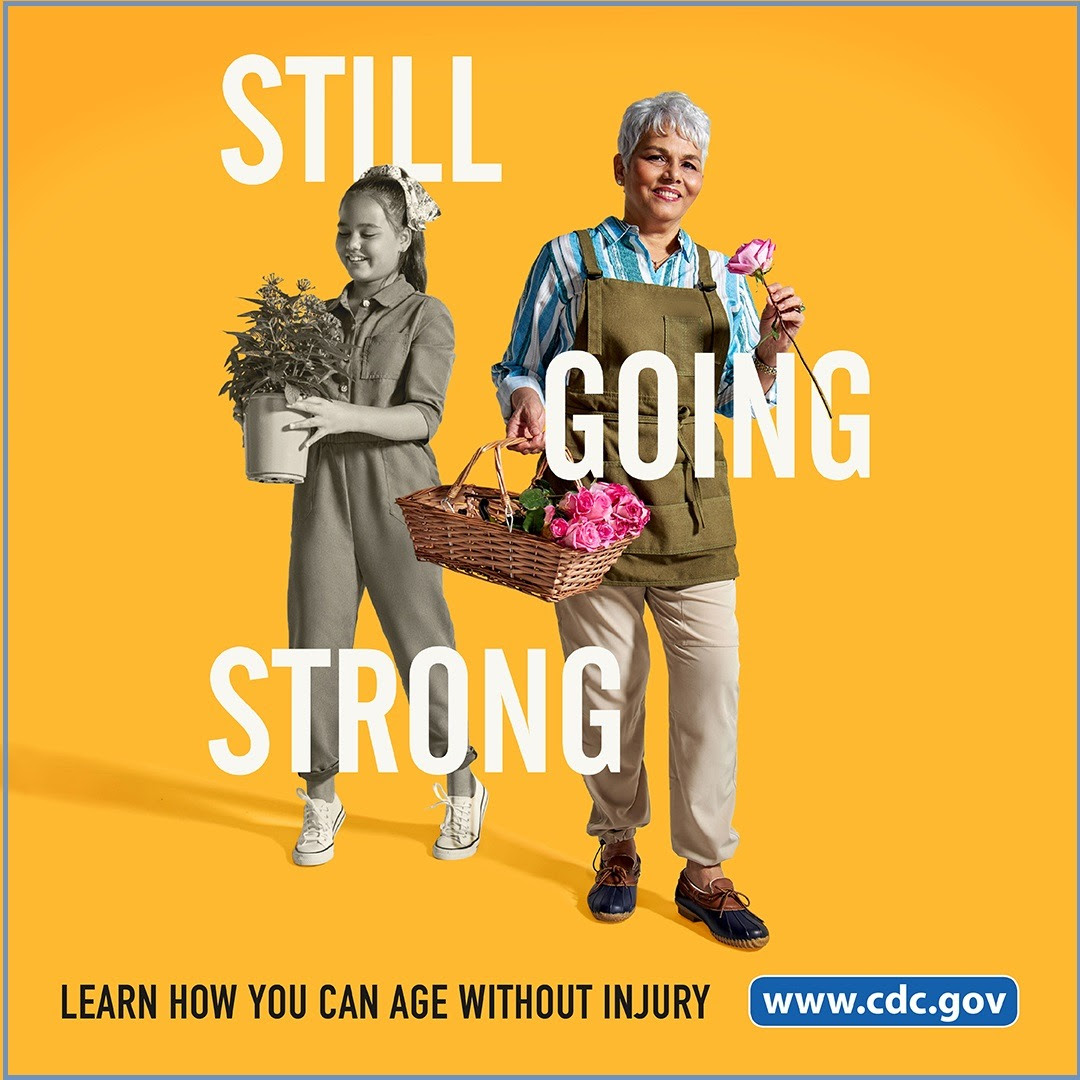 Injuries are not an inevitable part of aging and can be prevented. Visit the Still Going Strong website today for more information about preventing falls, motor vehicle crashes, and TBIs for older adults.
Injuries are not an inevitable part of aging and can be prevented. Visit the Still Going Strong website today for more information about preventing falls, motor vehicle crashes, and TBIs for older adults.
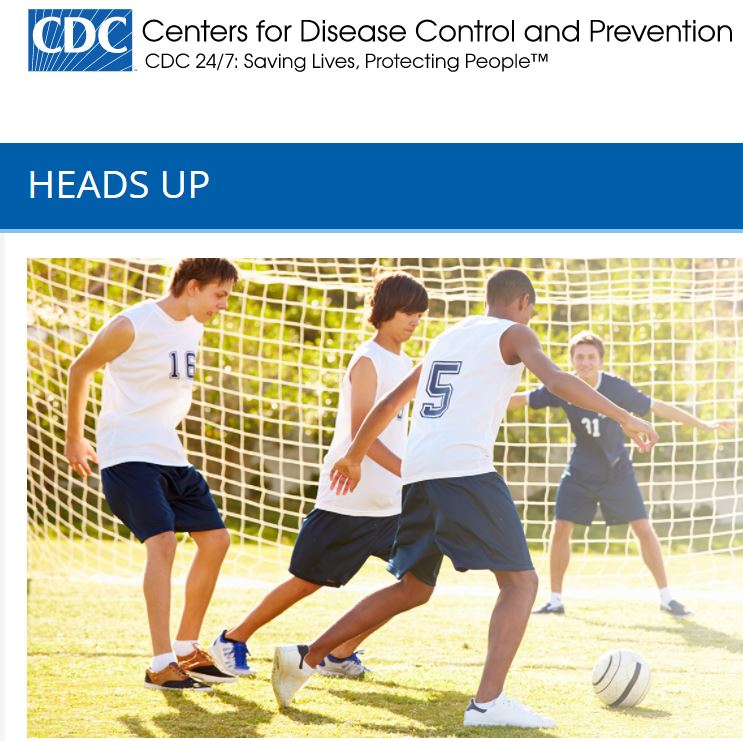 CDC HEADS UP: Safe Brain, Stronger Future. Keeping children and teens healthy and safe is always a top priority. Whether you are a parent, youth sports coach, school coach, school professional, or health care provider, this site will help you recognize, respond to, and minimize the risk of concussion or other serious brain injury.
CDC HEADS UP: Safe Brain, Stronger Future. Keeping children and teens healthy and safe is always a top priority. Whether you are a parent, youth sports coach, school coach, school professional, or health care provider, this site will help you recognize, respond to, and minimize the risk of concussion or other serious brain injury.

Center on Brain Injury Research & Training (CBIRT): CBIRT is a center under the Department of Psychology at the University of Oregon, conducts research and training to improve the lives of children and adults with traumatic brain injury (TBI).
- CBIRT’s research focuses on developing interventions to improve outcomes related to education, employability, and quality of life.
- Training activities promote the use of best practices among educators and other professionals who serve individuals with TBI.
- Archived Webinars: Access recorded versions of CBIRT’s webinars featuring experts in the field of brain injury.
Partners in these endeavors include individuals with TBI, family members, educators and other professionals who serve individuals with TBI, hospitals, and research colleagues throughout the United States and beyond.

Department of Defense TBI Center of Excellence: Mission: As the TBI Pathway of Care manager within the Military Health System, the Traumatic Brain Injury Center of Excellence promotes state-of-the-science care from point-of-injury to reintegration for service members, veterans, and their families to prevent and mitigate consequences of mild to severe TBI. TBICoE is a congressionally mandated collaboration of the Departments of Defense and Veterans Affairs and was formerly known as the Defense and Veterans Brain Injury Center (DVBIC).

Lash & Associates Publishing: Leading Source of Information on Brain Injury, Blast Injury, Concussion, and PTSD in Children, Adolescents, Adults and Veterans.

National Aphasia Association's Helpful Materials. In addition to the ones listed below, there are several different aphasia materials that may be of interest such as, therapy guides, videos, assistive technology resources and more found on their website.
- Aphasia Factsheet
- Aphasia Apps
- Aphasia Cafe – a series of video chats for persons with aphasia, caregivers and professionals.

National Collegiate Athletic Association (NCAA) is a member-led organization dedicated to the well-being and lifelong success of college athletes.

